Photo by Edward Mcquiston
They are seven, some of the shining stars of Wellesley athletics through the decades. Some have competed in NCAA national championships and have garnered All-American honors. Some have taken home scholar-athlete awards and hold records in their sports. One spent 16 years building Wellesley’s athletic program into what it is today. In October, they stepped into the campus limelight, interacting with students as they joined celebrations to induct them into the Wellesley Athletics Hall of Fame.
Each has a story to tell of the way sports have shaped and enriched her life. Betsy Turner Jordan ’59—a highly decorated masters swimmer—spoke to the magazine about her decades in the water. The stories of other inductees can be found at magazine.wellesley.edu.
When Betsy Turner Jordan ’59 came to Wellesley in the pre-Title IX days, there was no intercollegiate swimming program. As a teenager, she had set a national junior record in the 200-yard backstroke and won a three-mile national lake swim. At Senior Nationals, she had placed second in several backstroke events, and in 1952 she was a member of a 150-meter medley relay team that set an American record. But at the time, the only place women could go to college and still swim was Purdue University. “I didn’t want to go to Purdue. I wanted to go to Wellesley!” she remembers. So Jordan came and swam in intramural dorm meets—and water ballet performances.
In 1971, Turner plunged back into compet-itive swimming, this time at the masters level, while raising four children and earning a doctoral degree. She competed across the U.S. and participated in world championships as far away as Tokyo and Christchurch, New Zealand. She set 38 world records in different age groups for backstroke, butterfly, and individual medley. She has also competed in open water swims, most notably in 2012 as part of a six-woman over-70 team, where—at age 75—she helped set a new Catalina Channel Swimming Federation age group record that still stands.
Do you still swim competitively or just for pleasure? What’s your daily routine?
I swim primarily for pleasure now, although from time to time I am coaxed back into competition. For instance, my four children and I [formed] a team, called “the Jordan pod,” to compete in a 10-mile relay event in September to benefit juvenile diabetes. As for daily routine, it changes according to time of year and weather. Here in southern California, the ocean is warm enough for comfortable swimming usually through October. Otherwise, I seek out nearby pools for regular workouts. I try to swim at least three times a week, for about an hour.
What accomplishment are you most proud of?
The most thrilling thing for me was being inducted into the International Masters Swimming Hall of Fame in Fort Lauderdale, Fla., in 2005. My induction signifies long-term dedication to the sport of swimming, as well as specific accomplishments.
What are the most important lessons swimming has taught you?
In swimming, as in any other sport, sometimes you win and sometimes you lose. But overall, it is the participation that enriches. Learning to win graciously, and—perhaps even more important—learning to lose gracefully, teach one to enjoy a sport, to get to know one’s competitors, and to take delight in helping one’s body grow and develop. Friendships made through swimming are lasting and deep.
Any words of advice for older athletes?
Jump right in! There are skill levels for everyone. Your body will thank you for the regular attention and loving care you give to it. Your family will thank you for keeping yourself in good shape. Your friends will thank you for your time and attention. You will find that you have more energy, and that you fit comfortably into whatever life’s governing genie has in store for you.
Wellesley Athletics Hall of Fame 2018 Inductees
Katie Antypas ’99 Volleyball
Marret Arfsten ’03 Field Hockey
Sarah Hilgenberg ’00 Soccer
Elizabeth Turner Jordan ’59 Swimming
Jennifer Kegel ’88 Cross Country
Amy Ayres Parratto ’83 Diving
Louise O’Neal Director of Athletics and Department Chair, 1990–2006
Katie Antypas ’99, Volleyball
Katie Antypas ’99 is member of the Blue’s 1998 Final Four volleyball team that still holds one of the top records in NCAA history at 37–1; Antypas was an AVCA All-American setter and NCAA All-Tournament honoree in the same year. The co-recipient of the 1999 Barbara Barnes Hauptfuhrer ’49 Scholar-Athlete Award, she was twice named AVCA and NEWVA All-Region and was a NEWMAC All-Conference honoree in all four years of her collegiate career, as she registered 3,712 career assists and 1,051 career digs.
Antypas works at the Lawrence Berkeley National Laboratory in Berkeley, Calif., as the division deputy for NERSC, the supercomputing division at the lab.
What are your favorite Wellesley volleyball memories?
The Wellesley volleyball memory which evokes my strongest reaction was from my senior year when we won the Elite 8 match on the field house floor to advance to the Division III Final Four. I remember the screams from our fans echoing in the field house and our opponents getting flustered because they had never heard such high-pitched cheering at a sporting event. …
On my 21st birthday, I remember losing the NCAA Final Four match at Juanita College. We were crushed by a team from Iowa whose players towered over us. I remember the speech our coaches, Dorothy and Tom, gave in the locker room about our unlikely journey to the Final Four and why we had to fight to win one more match. Our resilient team of short underdogs fought back to win the third-place match, a win we seemed to savor more than the first-place winners.
It’s hard to overstate how much fun I had with my Wellesley teammates. They were a respite from the otherwise serious and studious atmosphere at Wellesley. I laughed harder with my Wellesley teammates than I ever had before, whether it was our ravenous middle blocker who ordered “Steak and eggs, but no eggs” for breakfast the second day of a tournament, or “after tournament” water fights in the shower. The camaraderie on our team was really magical.
How has your experience as an athlete helped you as a division deputy at the Berkeley Lab?
In volleyball, there is no way to win by yourself. For the team to win, you must pass and set the ball to your teammates. And a volleyball game is an accumulation of shorter points. You learn to shake off the last error, briefly consider what you did wrong, and move on to the next point. And volleyball is a game of momentum; you learn to keep the pressure on your opponent when you are ahead, and to change strategies when you are behind. Sports force you to fess up to your mistakes and keep your ego in check. (The scoreboard doesn’t lie.) And sports force you to figure out how to work with people on your team who you might never have chosen to be friends with off the court. All of these lessons apply equally to a volleyball game as they do to managing technical teams.
Sarah Hilgenberg ’00, Soccer
The only NSCAA National All-American in Wellesley soccer program history, Sarah Hilgenberg ’00 earned the honor in both 1998 and 1999 while helping the Blue to back-to-back NCAA Regional final appearances. Wellesley’s Barbara Barnes Hauptfuhrer ‘49 Scholar-Athlete Award winner in 2000, she was a four-year NSCAA and NEWISA All-Region and NEWMAC All-Conference honoree, she was voted the NEWMAC Women’s Soccer Athlete of the Year in 1999 – a fitting end to a career that included 65 points and 23 career goals.
What appeals to you about soccer?
It is fun, physical, and dynamic. Performance depends on individuals and teams. There’s a lot of strategy. I have observed and experienced that smart people can play smart soccer—which is really fun to play and watch!
How did being a student-athlete at Wellesley shape your college experience?
Being a Wellesley student-athlete shaped my experience in almost every way. Since soccer is a fall sport in college, I always arrived early to campus for pre-season. This was particularly helpful as a first-year student in that I had an immediate community around me with whom I identified and shared a passion. My closest friendships quickly arose from this community. I still count multiple teammates among my dearest friends
What were your proudest moments as an athlete?
Probably when I scored three goals in our NCAA regional semi-final playoff game at Williams during my senior year. I had never scored three goals before in one game. And it meant that our team could advance the farthest that we had ever gone in the NCAA tournament. We ended up ranked No. 10 in the nation, which felt like a great accomplishment.
What were the most important lessons you learned on the soccer field?
- Losing/failing is important and builds determination, motivation, and resilience.
- Good communication with teammates is essential for strong performance.
- There is much more to my life than soccer, yet participation in sport of one form or another is key to my well-being.
How are you involved in soccer or other sports now?
I played soccer recreationally until about the age of 30 when work demands as a pediatric resident became too difficult. During medical school, I coached at multiple camps and even helped coach a local team of young girls who I got connected with via one of my college teammates. This year, my 7-year-old daughter asked me to coach her team. My goal is to create a positive, fun atmosphere where the girls enjoy playing, hopefully learn something, and want to return again.
Amy Ayres Parratto ’83, Diving
Amy Ayres Parratto ’83, a five-time All-American diver at Wellesley, now coaches at Riptide Swimming in Apple Valley, Minn. She and husband, Mike, have coached together since 1984 and have two daughters, Melissa and Jessica. Jessica was an Olympian in platform diving in Rio in 2016. Amy enjoys participating in masters swimming and open-water swims in the Minnesota lakes.
When did you start diving?
I was swimming on a team in Cambridge, Mass., the Cambridge Sting Rays. A friend had gotten me involved shortly after my mother passed away when I was only 12. There were some classes offered in synchronized swimming and diving, and I signed up all on my own. I was 13. I took a diving class and just took right to it. It gave me a community that I really needed. Swimming and diving became my family.
How did you end up at Wellesley?
My mother was class of ’68, and my grandmother went to Wellesley, too. And both of my godmothers. Plus, I wanted to stay close to home. I didn’t want to be too far from my two younger brothers and my dad. My swimming coach took me to my interview. I was struck by how gorgeous it was, and I thought [swimming coach] Nancy Bigelow was the coolest person I’d ever met. Swimming and diving were super important to me. I also had applied to Rhode Island School of Design and gotten in, because art was also a big part of my life. When I visited Wellesley, I saw the art department and thought, if I get in, I’m going here. I think Nancy might have done a little pulling, and I got in.
Were there challenges to diving at the College then?
It was tough. Wellesley at the time only had a one-meter board. When I dove, I had to travel to Harvard and share a coach. He was a great guy, a great diver. He coached Wellesley, MIT, and Tufts at the Harvard pool—after the Harvard team was done and the club team was done. It was challenging to leave campus at 5 p.m. and not get home till 9:30, 10 at night. We had work to do! Sometimes, I had to take an MIT shuttle and walk across the bridge to get to the Harvard pool. But I stuck it out. I was definitely passionate about it!
Your daughter Jessica is an Olympian. How’s she doing?
She’s doing great. She still loves diving, is healthy and injury free, which is pretty remarkable in platform diving. She’s focused on 2020!

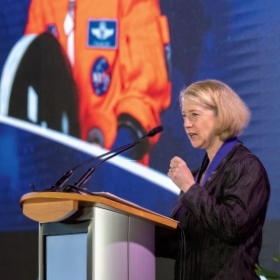
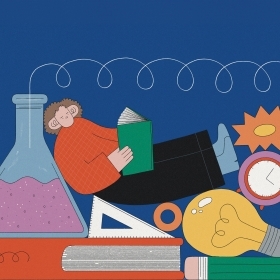
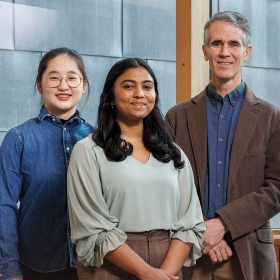
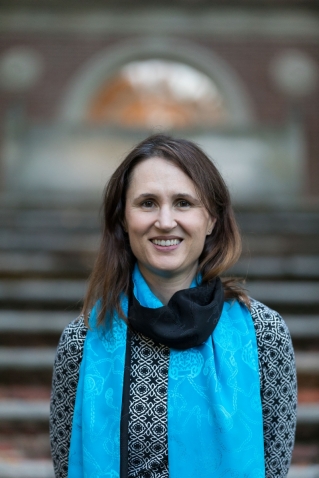
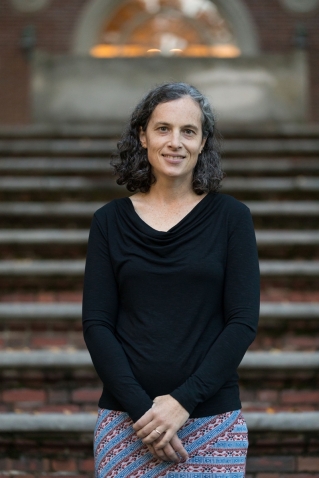
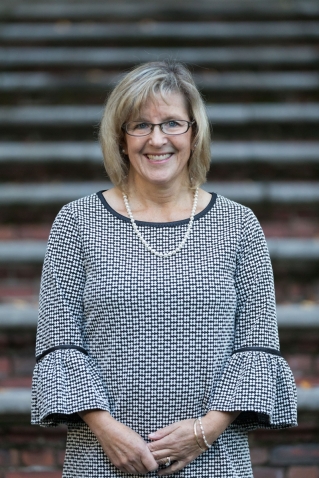
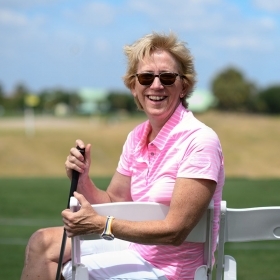
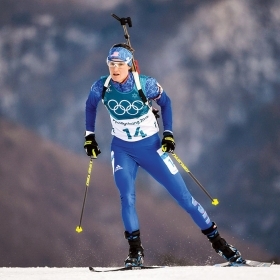
We ask that those who engage in Wellesley magazine's online community act with honesty, integrity, and respect. (Remember the honor code, alums?) We reserve the right to remove comments by impersonators or comments that are not civil and relevant to the subject at hand. By posting here, you are permitting Wellesley magazine to edit and republish your comment in all media. Please remember that all posts are public.